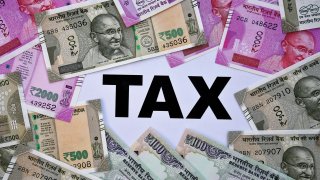
- It's been 5 years since India introduced its Goods and Services Tax, and while the government's revenue collection has soared, some analysts say it may be too soon to celebrate.
- Even though revenue collection from GST is higher in absolute terms, some question if the growth in collections will endure.
- "Future GST collection will be dependent on the growth performance of the Indian economy. If growth further slows down, then GST collection will be affected negatively," says senior fellow of Observer Research Foundation Abhijit Mukhopadhyay.
- There are divergent views on whether GST has made India a more attractive investment destination or if it has been effective in curbing "black money."
It's been 5 years since India introduced its Goods and Services Tax, and while the government's revenue collection has soared, some analysts say it may be too soon to celebrate.
India — the world's fifth largest economy with more than $3 trillion in GDP — has managed to double its tax base since the introduction of GST in July 2017.
While collections have increased and compliance improved, analysts point out that it doesn't necessarily lead to economic growth.
Feeling out of the loop? We'll catch you up on the Chicago news you need to know. Sign up for the weekly Chicago Catch-Up newsletter here.
GST collections grew from around 7.2 trillion rupees, or $90 billion, in the fiscal year 2017-2018 to 14.8 trillion rupees in the fiscal year ending March 2022, government statistics show.
Even though revenue collection from GST is higher in absolute terms, some question if the growth in collections will endure.
"GST cannot boost growth. Rather, growth boosts GST collection. So, future GST collection will be dependent on the growth performance of the Indian economy. If growth further slows down, then GST collection will be affected negatively," senior fellow with New Delhi-based think tank Observer Research Foundation Abhijit Mukhopadhyay told CNBC.
Money Report
"Somehow a thumb rule has emerged that if the monthly GST collection crosses 1 trillion rupees, or $12 billion, then it's a success," he said.
Among other things, rising inflation is likely to subdue demand and lead to lower collections, Mukhopadhyay said. "Rise in commodity and food prices has substantially contributed to the GST collection. If inflation keeps increasing, it will eventually have a dampening effect," he said.
What India's GST has achieved
The goods and services tax — which was enacted by the government of Prime Minister Narendra Modi —subsumed 17 local levies like excise duty, service tax and value-added tax and 13 other charges.
Under the nationwide tax regime, these varied taxes were replaced by four rate structures ranging from 5% tax on essential items to the top rate of 28% on things like cars and luxury items.
"GST remains a landmark tax reform of independent India, despite many implementation issues that have been experienced in its first five years," Rajan Katoch, a former heavy industries secretary of India, told CNBC.
Not only has it strengthened coordination within the federal state, it has also "improved tax buoyancy, curbed evasion of indirect taxes and drawn more and more smaller taxpayers into the formal system," Katoch said.
Before GST was introduced, India's tax system — often intricate and impenetrable — was notoriously difficult to navigate.
The "good and simple tax," as Modi has described it, has expanded the numbers of registered GST taxpayers to 13.6 million from around 6 million five years ago, according to figures cited by Indian Finance Minister Nirmala Sitharaman in an article in local media.
Impact on foreign investment, 'black money'
There are divergent views on whether GST has made India a more attractive investment destination or if it has been effective in curbing "black money" — undeclared income on which no tax has been paid.
Black money has long been known to play a part in India's economic activity. In 2012, the Indian finance ministry released a "white paper" on black money, defined by the government as "any income on which the taxes imposed by government or public authorities have not been paid."
Former industry secretary Katoch claims that GST has had an impact on black money.
"Since [GST] has resulted in the formalizing of transactions that previously were of an informal nature, yes, it would have led to a reduction in black or unaccounted cash flows," he said, adding it's difficult to estimate the extent of the reduction.
But not everyone agrees.
"Black money is generated in real estate, trade and politics. In all three cases, cash transactions continue. Neither demonetization nor tax reform have had much impact," Sanjaya Baru, a New Delhi-based economist told CNBC.
Demonetization refers to the controversial move by the Modi government in 2016 to withdraw notes of high denominations as legal tender as a way to flush out black money.
The government had hoped that the tax reforms would increase India's attractiveness to foreign investors, but this may not have been borne out, according to Baru, who was media advisor to former Prime Minister Manmohan Singh.
"In theory, GST is supposed to make India more attractive to foreign investors, especially in the manufacturing sector," he said. "In practice, however, [foreign direct investment] in manufacturing has not been very impressive."
India's Doing Business ranking by the World Bank climbed to the 63rd place in 2020 from 100th position in 2017 – a jump of 37 places in a span of 3 years.
While it cannot be directly attributed to India's tax reforms, tax payment is one of nearly a dozen factors used to measure the ease of doing business in the countries ranked.
"The administration's reform efforts targeted all of the areas measured by Doing Business, with a focus on paying taxes, trading across borders, and resolving insolvency," the World Bank's 2020 report said.
Political wrangling ahead
Rising inflation is not the only cloud on the horizon for the GST scheme.
India is expected to make a politically precarious decision in August about whether to bring petrol, diesel and so-called "sin goods" like liquor and tobacco under GST, a federal tax.
"Petro products should be included within the GST framework. That can increase revenue drastically, and will also dampen inflation," said Mukhopadhyay from the Observer Research Foundation.
However, it is an ambitious goal and could become a political challenge. Duties on these goods are now collected by state governments, headed in some cases by political opponents and it will not be easy to persuade them to give up this lucrative stream of revenue.
Separately, the federal government is also facing other demands from state governments.
Since 2017, the federal government has been compensating state governments for some taxes revenues they lost as a result of GST.
"That ended, on June 30, but states are now seeking an extension, citing the two 'lost' pandemic years," equity strategist with macroeconomics firm WealthMills securities in Mumbai Kranthi Bathini told CNBC.
For Modi's government, this demand could be the beginning of a long political fight — even in states ruled by his ruling BJP or its political allies.






